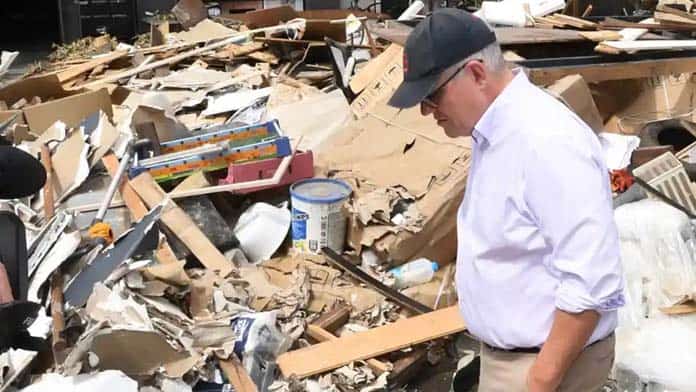The big swing against the Liberals in the South Australian election is another blow to Scott Morrison. He will now be even more panicked about his own re-election chances.
The South Australian Liberals lost government after one term, having presided over an Omicron wave debacle like that seen in other states in December and January.
Labor is consistently leading Morrison by a massive 55 to 45 per cent according to Newspoll.
The floods in northern NSW and Queensland have brought back memories of his smug indifference during the Black Summer bushfires of 2019-20.
Again he was far too late to act, and put marketing spin ahead of actually offering help.
It took ten days for Morrison to declare a “national emergency”, waiting until he could get to Lismore to make an announcement for the TV cameras. He carefully stage-managed his appearance, avoiding any locals to prevent any repeat of the angry response directed at him following the bushfires.
The scale of the disaster has re-focused attention on Morrison’s climate failures. The Coalition has rushed to start construction on the new gas plant it is funding with $600 million of taxpayers’ money at Kurri Kurri, and announced another $50 million for gas pipelines and infrastructure projects.
Morrison is taking every opportunity to expand the use of fossil fuels, using the war in Ukraine to promote Australian coal and gas exports as alternatives to Russia’s. But the surge in petrol prices has added to Morrison’s problems with inflation, which is now outpacing most pay rises and increasing the cost of living.
The Coalition have also seized on the war to increase Australia’s military and its sabre rattling against China.
Morrison will spend $38 billion to boost military personnel by almost one third to 80,000 by 2040. This will include expanding the navy to operate the nuclear subs the government is buying at a cost of at least $170 billion.
Defence Minister Peter Dutton has also blamed China for “supporting” Putin’s invasion of Ukraine, labelling China as part of an “unholy alliance” with Russia.
But Australia’s military expansion makes conflict with China more likely. It can only fuel the regional arms race and see billions more wasted on weapons. The nuclear subs are designed to operate aggressively alongside US forces off the Chinese coast.
Morrison has joined other Western leaders in pouring weapons into Ukraine, announcing almost $100 million in military aid. Socialists oppose Morrison’s war-mongering in Ukraine and against China.
The billions going on the military could be funding hospitals and schools, or the urgent climate transition we need.
Don’t rely on Labor
Despite Morrison and Dutton’s efforts, so far, there is no sign that their militarism is winning electoral support. Labor leads the Coalition on who would better manage relations with China, by 37 to 28 per cent, according to Essential polling. But, shamefully, Labor leader Anthony Albanese has backed the government’s military expansion, supporting the nuclear subs and promising to raise military spending to 2 per cent of GDP.
Albanese’s small target strategy has seen him drop practically any promises of change, hoping that anger against Morrison alone will deliver Labor into office.
On climate, Labor’s emissions reduction target is less than the targets backed by the Australian Industry Group and the Business Council.
Albanese has even pledged his support for further “economic reform”, promising to “collaborate with business” and “take my lead from Bob Hawke and his successor Paul Keating” and even quoting Liberal Prime Minister John Howard.
Business Council of Australia chief executive Jennifer Westacott is singing Albanese’s praise saying, “what is good about Mr Albanese is he understands the fundamentals that to have a job, you need a boss, and to have a boss you need thriving business, and he gets that.”
More protests and strike action are what’s needed to help finish Morrison off. In NSW, nurses will strike again on 31 March, likely followed by public school teachers in term two. Teachers in Catholic systemic schools have also voted to strike and there is ongoing action planned by train drivers.
The national School Student Climate Strikes on 25 March are another chance to take the fight to Morrison. They need to be part of building an ongoing movement prepared to keep fighting regardless of the Federal election result. Activists should not fall into the trap of thinking Labor, independents or the Greens will deliver significant change through parliament.
It is only by building a union fightback and stronger movements on the streets that we can win the rights at work and pay we deserve, as well as fight for system change to stop the horror of war and climate catastrophe.






